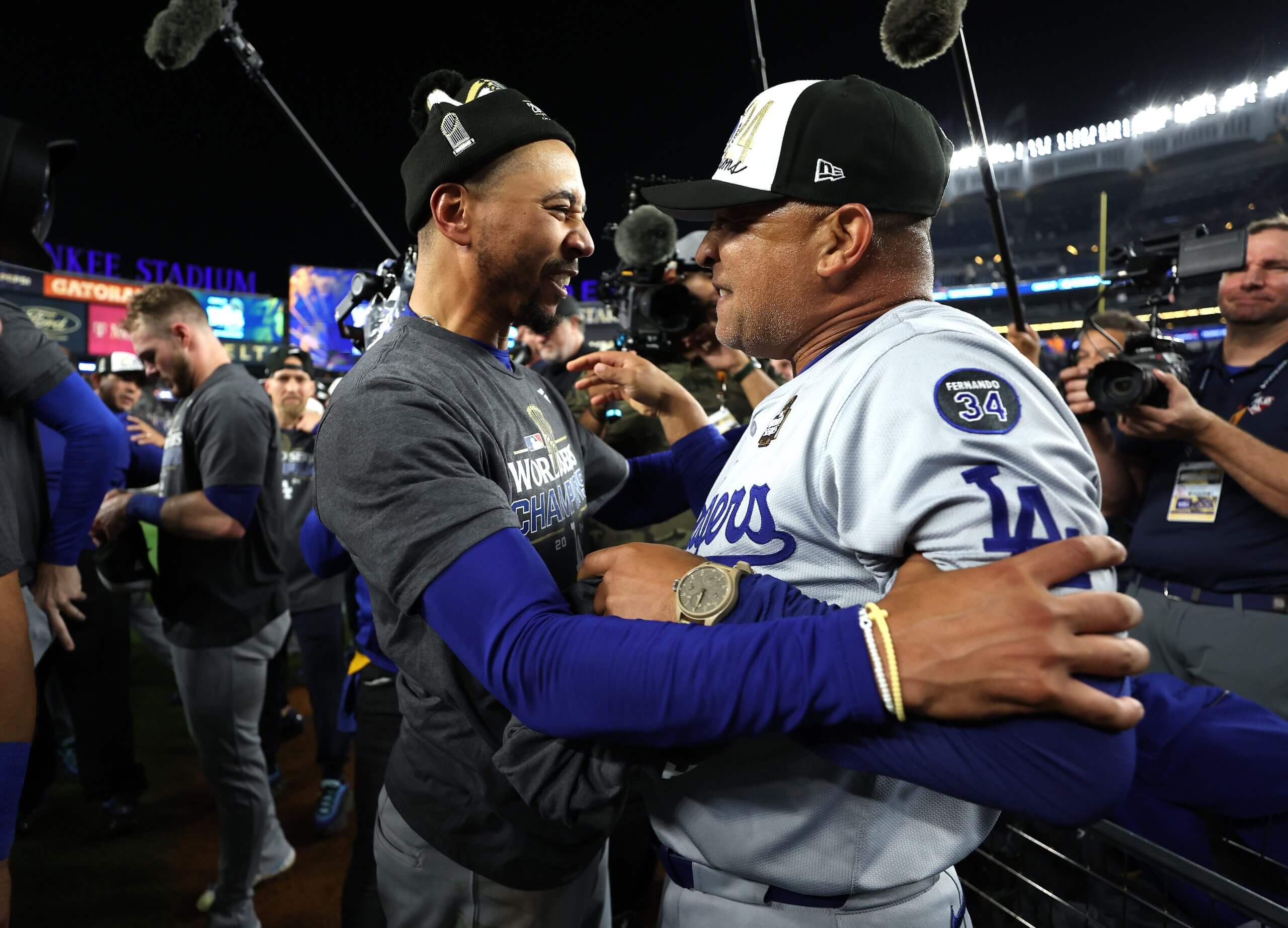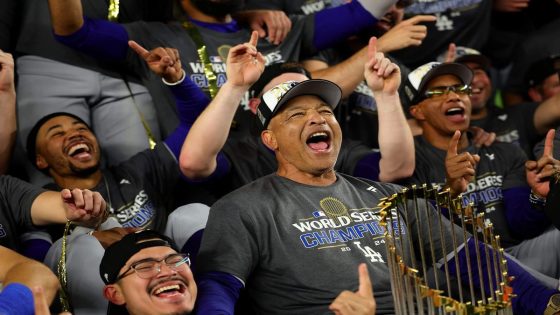NEW YORK — After the final game of October, Dave Roberts winded through throngs of people, stepping over gold streamers spread across the outfield grass of Yankee Stadium. His two children and his wife were by his side. He needed to get to the clubhouse to celebrate downing the New York Yankees in the World Series, but members of the Los Angeles Dodgers universe kept stopping him. He shared embraces with Magic Johnson, with Billie Jean King, with Ellen Kershaw.
Along the third-base line, a rowdy band of Dodgers fans saluted the players as they came off the field. Eventually, Roberts made it through the hugs and backslaps to approach the dugout. There have been times during his nine-year tenure as manager when he has heard jeers and read calls for his dismissal. All he felt in the early hours of Thursday morning, after a riveting 7-6 Game 5 victory, was raucous cheering. He doffed his cap and took in the adulation as a two-time World Series champion manager.
“It’s a lot of vindication for Dave,” veteran pitcher Clayton Kershaw said. “Doc did a great job. He did a great job this postseason.”
The 2024 World Series represented Roberts’ finest hour as a manager. The stakes for this season were set as soon as the team signed Shohei Ohtani last winter: Anything less than a championship would be considered a failure. Roberts led a group that met those expectations despite a slew of misfortune. He overcame structural issues with the roster. His pitching staff lacked depth. The team ran bullpen games in all three postseason series. At times, Roberts strategically punted away chances to win.
Yet in the end, after staring down the San Diego Padres, the New York Mets and the Yankees, the Dodgers stood alone on the big-league mountaintop. Roberts can start posing for his bust. He entered this month aware that his job might not be secure. He will exit on track for the Hall of Fame.

His .618 winning percentage is the best of any non-Negro Leagues manager. He has never won fewer than 91 games in a full season; the Dodgers have topped 100 victories in five of those eight years. He has now won the World Series more often than Bobby Cox (class of 2014), Whitey Herzog (class of 2010) and Jim Leyland (class of 2024). He has won the pennant four times, as often as Earl Weaver (class of 1996), Dick Williams (class of 2008) and Tom Lasorda (class of 1997).
Roberts called it “humbling” to be mentioned in the same category as Lasorda and fellow former Dodgers skipper Walter Alston, a four-time champion. “Never thought I would be in that same conversation,” Roberts said. “I’m a part of a great organization, a lot of great people around me supporting me, and we’ve won a lot of ballgames. This is something I really wanted. I wanted this one.”
His colleagues were more effusive. “Dave’s a Hall of Famer,” Dodgers bullpen coach Josh Bard said. “It’s a fact. He’s won it all different kinds of ways. He should have three.”
The sting from the 2017 World Series against the Houston Astros still permeates the organization. The series represented Roberts’ first dalliance with sustained public opprobrium. He took heat for his bullpen decisions, unaware Houston had utilized an illegal sign-stealing system. A year later, amid the Dodgers losing the World Series to the Boston Red Sox, president Donald Trump insulted one of Roberts’ maneuvers. In 2019, when the Dodgers suffered a shocking early exit, Roberts received hellacious criticism.
Roberts achieved a measure of satisfaction in 2020 when the Dodgers won the title. The championship still came with some strings. Because of the pandemic, the regular season lasted only 60 games. The World Series took place in Arlington, Texas. There was no parade. And even though Roberts executed some of his best strategic triumphs in that postseason, the results did not shield him from future vitriol.
During the next three seasons, the Dodgers could not conjure up postseason success to match their regular-season dominance. Roberts received scrutiny for his bullpen management in 2021, when using starter Julio Urías in relief backfired, and in 2022, when the final loss to the San Diego Padres included a relief corps meltdown. In 2023, after the 84-win Arizona Diamondbacks trounced the 100-win Dodgers, Roberts vowed to avoid a repeat. “I’ve got to do a better job of figuring out a way to get our guys prepared for the postseason,” Roberts said. “I’ll own that.”
After spending $1.4 billion this offseason, the Dodgers entered 2024 as the prohibitive betting favorite to win it all. The path to the crown was packed with potholes. There was the gambling scandal involving Ohtani’s former interpreter Ippei Mizuhara. There was an onslaught of injuries. There was a late-season charge for the National League West from the Diamondbacks and Padres.
Andrew Friedman, the president of baseball operations who hired Roberts after the 2015 season, credited Roberts for buoying the group in times of strife. “His relentless optimism is one of his hallmark strengths,” Friedman said. “And obviously, we went through a lot this year. A lot of adversity. His ability, during some of our more difficult times, to breathe optimism into the group and remind them to look around and see just how talented the guys are who are around, was very significant.”
Kiké Hernández played for Roberts for five years before departing in free agency. Upon his return to the Dodgers in 2023, Hernández noticed Roberts had improved as a communicator. “Dave is such a nice guy,” Hernández said. “He’s such a positive, energetic personality. I think in the first couple years, it was hard for him to have the tough conversations. As a manager and as a good communicator, you have to be willing to be 1,000 percent honest and have the tough conversations. I feel like that’s been the biggest difference.”
As the postseason neared, Dodgers officials discussed how to prepare for October. The players, coaches and executives were all frustrated with the team’s inability to perform after the brief layoff wrought by winning the division. The Dodgers finished the season with 98 wins, the best record in baseball. Roberts and the front office trusted players like Hernández and Max Muncy to organize team-building activities during the Wild Card round, so the players could stay together during the break.
The unity could not solve an obvious problem with the roster. There were not enough starting pitchers. The list of injured arms included Kershaw and crucial offseason acquisition Tyler Glasnow, plus youngsters like Gavin Stone, Emmet Sheehan and River Ryan. The Dodgers entered October with a three-man rotation. In a seven-game series, that meant he would have to make some hard decisions. There would be some games where he could not chase victories.
In his first years at the helm, Roberts excelled at identifying high-leverage situations. This was still an era when many managers assigned roles based on innings, rather than matchups. Roberts utilized data from the front office to smother an opposing team’s best hitters with his best relievers. In an extended series, though, there were consequences to repeated usage of even the top arms.
During Game 3 of the 2017 World Series, Roberts used Kenta Maeda for eight outs despite a sizable deficit. The manager believed his offense deserved a chance to get back into the game. Yet when Maeda returned to action two days later, he served up a back-breaking home run to Jose Altuve. In 2019, Pedro Báez was unavailable for the season’s final game, because he had appeared in the previous two — both losses.
“I have evolved,” Roberts said earlier this month. He described his “trust tree,” the collection of relievers he believed in the most. “Each moment you feel that that’s always the best option, for fear that if you go somewhere else or with another player and it doesn’t work out, you didn’t deploy your best option in that moment,” he said. “That’s the inner struggle that any manager has. I’ve lived it.”
Roberts carried that experience into this postseason. He called upon his lower-leverage pitchers to soak up outs in Game 2 and Game 5 against the Mets, which left him a full complement of relievers to win the pennant in Game 6. He repeated the approach against the Yankees. Roberts stuck with the less reliable arms in Game 4. He was confident his group could end the series on Wednesday.
He was right.
“Being short starting pitchers, he had to make some really tough decisions,” Hernández said. “It seemed like this October, he pushed all the right buttons.”
Roberts already has a presence in Cooperstown. He donated the cleats he wore to steal second base for the Boston Red Sox in the 2004 American League Championship Series. After 2020, the Hall collected his jacket and his Dodger blue mask, a relic from the pandemic. He offered his cap for commemoration after the victory on Wednesday. In time, Roberts will have another reason to visit the museum. He can go check out his own visage encased in bronze.
(Top photo of Dave Roberts: Alex Slitz / Getty Images)





